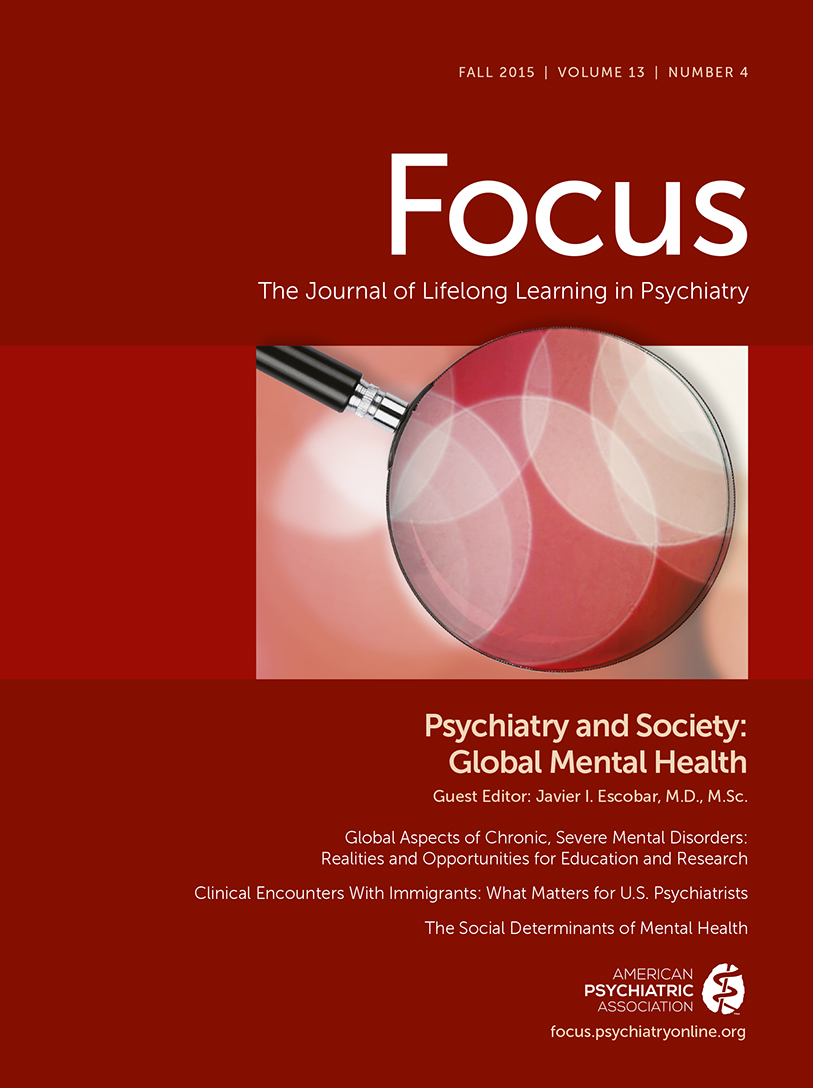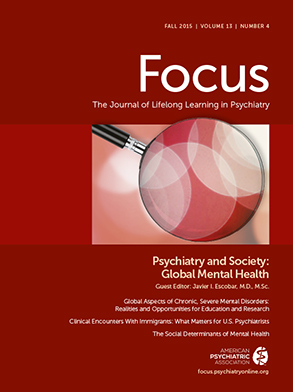Increases in international travel, trade, and immigration have led to enhanced global health interdependence. The United States has also experienced an expansion of the mosaic of diverse cultures, languages, and health values. In this context, it is imperative that physicians conceptualize health in a global context to address such issues as infectious disease control, refugee health, treatment of trauma-related conditions, and the tremendous burden of mental health and substance use disorders worldwide (
2). For example, depression ranks as the third leading contributor of disease burden globally, yet this disorder has historically been conceptualized as a disorder of westernized industrial cultures (
3,
4). Physicians require an understanding of the cultural complexity of health care to effectively address the needs of the patients they treat.
Clinical Vignette
Mr. Nogasari was a 24-year-old graduate student from Japan visiting the University Health Service due to concerns of offensive body odor that had not resolved during the past several months despite frequent showers and countless deodorants. Mr. Nogasari reported that he was self-conscious about this embarrassing problem and had become withdrawn from others because of it. He was only leaving his apartment for classes and had stopped spending time with the few friends he had made in the past 6 months. He believed that others were starting to avoid him, and he sought medical help out of desperation.
Dr. Pratham, the primary care physician at the health service, had completed a review of systems, physical examination, and routine blood screening. Mr. Nogasari endorsed difficulty falling asleep and diminished appetite without loss of weight. He had no chronic health problems, did not take medication, and reported no use of substances. He reported with dismay that his academic work was not up to his usual high standards. There were no psychotic symptoms or thoughts of harming himself or others. He denied being depressed. He only wanted to rid himself of his terrible body odor. Dr. Pratham, noting no body or breath odor, and with physical examination and screening laboratory test results being normal, believed that these symptoms were likely psychiatric in nature. She consulted Dr. Garcia, a psychiatrist in the health center.
Mr. Nogasari was notably distressed when Dr. Garcia introduced himself as a psychiatrist. “I’m sorry,” Mr. Nogasari interjected politely. “My problem is with an odor, not with my head. I do not need a psychiatrist.”
“Yes,” Dr. Garcia nodded in agreement. “Dr. Pratham commonly asks me to consult if it is not clear what is causing the problem. I am also a physician, and sometimes I can help.” Dr. Garcia waited for Mr. Nogasari’s reaction. It was a furrowed brow. “You don’t believe in going to a psychiatrist?” Dr. Garcia queried.
“Only if the sickness is in the head. Not for body odor,” Mr. Nogasari replied.
“Fair enough,” smiled Dr. Garcia. “I wouldn’t go to a psychiatrist for body odor, either.” After a pause, Dr. Garcia mused, “We all worry about how we come across to others. Sometimes bright and accomplished students become overly concerned. Perhaps you are overly concerned about body odor. Your hygiene is very good and I smell no such odor.”
“Perhaps you have a smell disorder,” Mr. Nogasari noted, without a hint of humor.
Dr. Garcia recalled the culture-bound syndrome called taijin kyofusho, the fear of offending others because of socially awkward behavior or an imagined offensive characteristic. He thought this was likely the case. In Western culture, it may be diagnosed as a social phobia or depression. However, Mr. Nogasari was clearly upset at the notion of having the symptoms defined in mental health terms. Dr. Garcia peered inquisitively at Mr. Nogasari. “What do you think is causing the odor?”
“I don’t know,” Mr. Nogasari said emphatically, a look of grief contorting his features. “But I think others are avoiding me. If I offend them more by my odor, they may never want to be with me again.”
Dr. Garcia and Mr. Nogasari chatted about how difficult the cultural transition had been. His professors and classmates spoke English so quickly. He studied constantly but still was not at the top of the class. He did not understand the jokes they told. He felt so different and awkward. “There is a Japanese club on campus that may help you not feel so isolated while you make friends with your other classmates,” suggested Dr. Garcia. “Do you think that would be helpful?”
Mr. Nogasari looked embarrassed. “I told myself I wouldn’t resort to that—just being with my own people, I mean,” he replied.
“Ah, but it isn’t only being with your own people,” Dr. Garcia reassured. “It is sometimes being with others who speak your language and have familiar habits—in addition to your other social connections.”
“But what if they are offended by my odor, as well?” Mr. Nogasari blurted.
“You smell fine to me,” Dr. Garcia asserted, apprehensive about how this statement would be received.
“Well, is that your prescription, then, Dr. Garcia? To join the Japanese club?” Mr. Nogasari asked hopefully.
“Yes,” Dr. Garcia replied resolutely.
“Okay then, I guess I have to do it,” Mr. Nogasari asserted. “How does this work? Do I come back next week to report about the odor problem?” Mr. Nogasari asked.
“Yes. Just make the appointment at a convenient time with the receptionist,” Dr. Garcia nodded solemnly. “I will get a new body wash on my way home. And I will come to the appointment next week,” Mr. Nogasari said, smiling for the first time all day. Dr. Garcia smiled back as he said goodbye.

